The Academy’s Commission on the Humanities and Social Sciences is advancing arguments for the importance of these disciplines to the nation’s intellectual and economic strength, public institutions, and civil society. The Commission is led by Richard H. Brodhead, president of Duke University, and John W. Rowe, chairman emeritus of Exelon Corporation. Commission members include leaders from higher education, business, the arts and humanities, and public affairs.
In recent months, the Commission has hosted a series of regional forums to collect testimony on the value of the humanities and social sciences. These forums, undertaken at the suggestion of Philip Bredesen, former governor of Tennessee and chair of the Commission’s Publicity Committee, are providing members with a more complete understanding of the many communities within and beyond academia that draw on the humanities and social sciences for their livelihood and well-being.
The forums have received extensive media coverage and have identified new participants and new audiences for an inclusive public campaign to follow the publication of the Commission’s initial report, forthcoming in 2013.
Cambridge Forum – July 17, 2012
The Academy piloted the first forum at its Cambridge headquarters in July. The meeting, organized in collaboration with the six humanities councils of New England, focused on civics education and the importance of teaching history. Commissioners David Souter (Supreme Court of the United States), Annette Gordon-Reed (Harvard University), Philip Bredesen (former governor of Tennessee), and Richard Freeman (Harvard University) joined members of the regional humanities and education communities, including the leader of a Bhutanese refugee community, a deputy commissioner of state economic development, and an as sociate justice of the Massachusetts Appeals Court, as well as educators and representatives of state humanities councils.
Justice Souter, pondering the importance of the humanities, said: “I think we want to promote – what I think it is essential to American government that we do promote – is a sense and understanding that we do not exist in our opinions in isolation. The humanities perhaps ultimately teach that . . . we are not alone.”
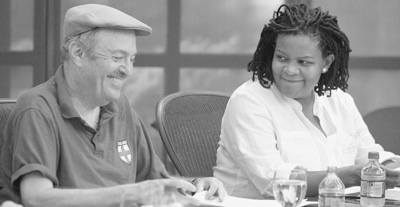 |
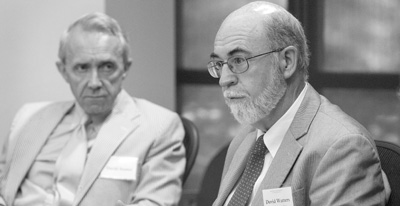 |
| Richard Freeman (Harvard University) and Annette Gordon-Reed (Harvard University) | David Souter (Supreme Court of the United States) and David Watters (New Hampshire State Senate; University of New Hampshire) |
Stanford Forum – September 4, 2012
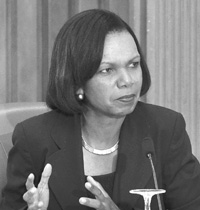 Condoleezza Rice (Stanford University) |
A forum held at Stanford University in September, chaired by Stanford President John Hennessy, discussed the importance of the humanities and social sciences to international relations, national security, and global competitiveness. Speakers included several former Cabinet members as well as a Stanford undergraduate student. Representatives from universities; the military; private enterprise; and Cal Humanities, the state humanities council, participated in the day’s events. Former Secretary of State Condoleezza Rice established a common theme for the conversation when she linked a nation’s self-awareness with its capacity to tackle international challenges: “We are, as Americans, losing the sense of ‘us.’ One way not to fear ‘them’ is to have a strong sense of ‘us.’” Retired Army Lieutenant General and former U.S. Ambassador to Afghanistan Karl Eikenberry pointed out that sound international policy requires a deep knowledge of other cultures and languages, as well as an understanding of our own nation’s history and traditions: “If you aspire to be a transnational bridge, you have to be grounded on both sides of the river.”
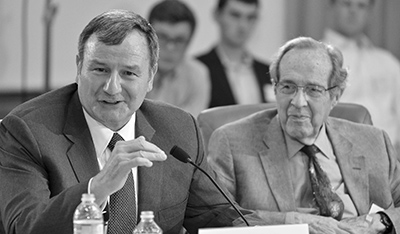 Karl Eikenberry (Stanford University) and William J. Perry (Stanford University) |
St. Louis Forum – September 7, 2012
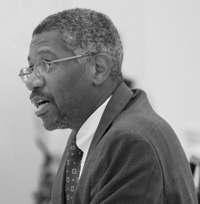 Gerald Early (Washington University in St. Louis) |
In September, Gerald Early (Washington University in St. Louis) organized and moderated a forum at the Missouri History Museum in St. Louis on the importance of the humanities and social sciences in local communities. Leaders of fifteen Missouri cultural institutions and community groups joined in the day’s discussion. Chief Glenna Wallace of the Eastern Shawnee Tribe declared the study of history crucial for creating a sense of self and community among Native Americans. Geoff Giglierano, executive director of the Missouri Humanities Council, extended that message to the entire nation: “Just as an individual who has a flawed or incomplete memory and conscience can’t function, a society, a civilization, a nation with a flawed or incomplete memory and conscience is in a lot of trouble. It is not going to function.”
Miami Forum – September 14, 2012
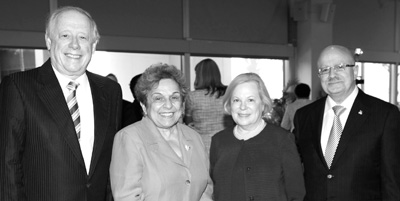 Philip Bredesen (former Governor of Tennessee), Donna Shalala (University of Miami), Leslie Berlowitz (American Academy), and Eduardo Padrón (Miami Dade College) |
Donna Shalala, president of the University of Miami, and Eduardo Padrón, president of Miami Dade College, cohosted a forum in September on the importance of the humanities to the multiethnic culture of southern Florida and to the development of a shared civic identity. The meeting featured singer Gloria Estefan, who testified on the critical importance of funding art, music, history, and civics courses. Panelists stressed how essential it is for members of the wider humanities and social sciences communities to form partnerships across the education continuum, and how powerful those collaborations can be. “It is through the humanities that we best record, share, and pass on the truths that make up the human experience,” said Alina Interián, executive director of the Florida Center for the Literary Arts at Miami Dade College. “[P]eople who learn how to think, who are trained how to think, are better problem solvers, more generous in their understanding of others, better able to understand many perspectives before making decisions. They make better citizens in the kind of democratic, free societies we value and cherish and for which we have fought so hard in our country.”
Durham Forum – October 26, 2012
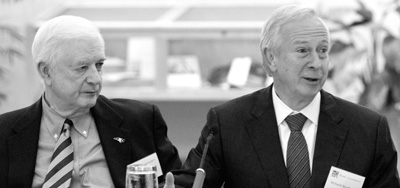 James B. Hunt, Jr. (former Governor of North Carolina) and Richard Brodhead (Duke University) |
In October, Commission Cochair and Duke University President Richard Brodhead hosted a forum on how to bolster teaching and research in the humanities and social sciences at a time when public support and student enrollments are falling. Nearly two dozen North Carolina-based English and social studies teachers, arts administrators, and educational policy leaders offered their impressions of the state of the humanities. Attendees included former North Carolina Governor James B. Hunt, Jr., interim Chancellor of North Carolina Central University Charles Becton, and President of the National Humanities Center Geoffrey Harpham. Many speakers noted that the humanities offer students a deeper self-understanding and are key to solving the problems of the future. Todd Roberts, chancellor of the North Carolina School of Science and Mathematics, argued for the crucial connections between scientific, social scientific, and humanistic research: “Grand challenges can’t be solved by science and technology alone.”
New York Forum – November 7, 2012
Anthony Marx, president of the New York Public Library; Pauline Yu, president of the American Council of Learned Societies; and Carl H. Pforzheimer III, manager of Carl H. Pforzheimer and Co. LLC, cohosted a forum in November on the importance of libraries and advanced research in the humanities. Historians, novelists and poets, architects, artists, and librarians spoke about the crucial importance of public access to books, research documents, and venues for the exchange of ideas. In his opening remarks, Anthony Marx cited the enormous crowds that visited the library in the aftermath of Hurricane Sandy as evidence that “people will fight their way through a storm to be able to do the work of the humanities, and to be able to inspire each other by doing it together.” Many speakers joined Pauline Yu in stressing the need to support ongoing, advanced research in the humanities as part of an overall strategy for preserving and advancing the intellectual life of the nation: “[T]he knowledge of the humanities will not vanish instantly, but it will ineluctably degrade if it is not constantly renewed by rigorous research and the transmission of advanced expertise to the next generation of scholars.”
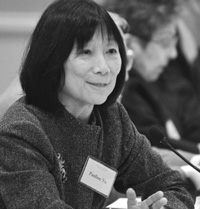 |
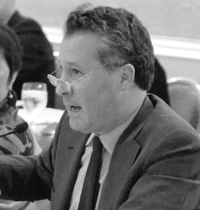 |
| Pauline Yu (American Council of Learned Societies) | Anthony Marx (New York Public Library) |
Audio and video from the forums are available on the Academy website.